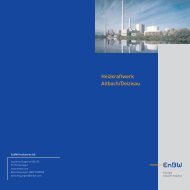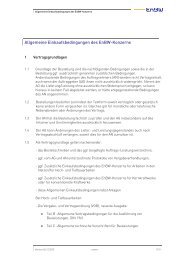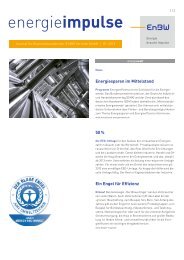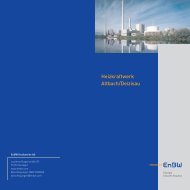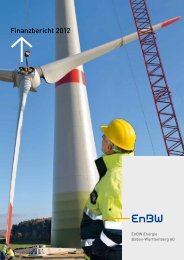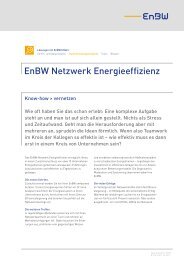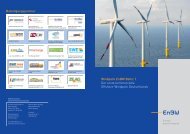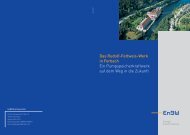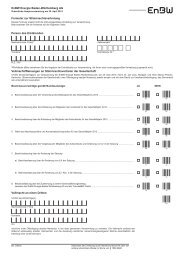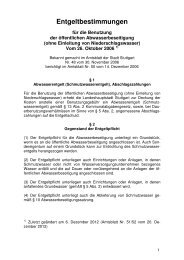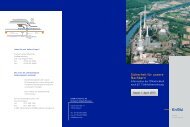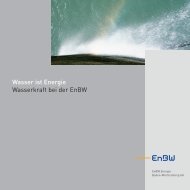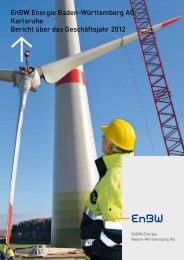Environmental Report 2000 - EnBW
Environmental Report 2000 - EnBW
Environmental Report 2000 - EnBW
You also want an ePaper? Increase the reach of your titles
YUMPU automatically turns print PDFs into web optimized ePapers that Google loves.
State of the Environment <strong>Report</strong> for the Business Divisions<br />
Business Division Energy<br />
Energy is the core business of <strong>EnBW</strong>. The high-profile Electricity division is active in all<br />
stages of the value added chain – from energy generation, energy transmission and energy<br />
distribution to energy trading and energy sales. <strong>EnBW</strong>’s energy operations also<br />
extend to gas and district heating.<br />
<strong>EnBW</strong> Kraftwerke AG<br />
Electricity generating capacities, power<br />
plant holdings and electricity supply<br />
contracts are pooled at <strong>EnBW</strong> Kraftwerke<br />
AG. With a power provision of<br />
over 49 billion. kWh a year, this wholly<br />
owned <strong>EnBW</strong> subsidiary is one of the<br />
major energy producers in Germany.<br />
The company has 1,661 employees<br />
and an overall electricity capacity of<br />
over 10,000 MW, around half of which<br />
comes from its six own power plants<br />
with an overall output of over 5,130<br />
MW. Power generation based on nuclear<br />
fuel, coal, gas, oil and hydroelectric<br />
power ensures an efficient and environmentally<br />
friendly production mix.<br />
By optimising the efficient use of its<br />
power plants and through long-term<br />
purchase and supply agreements,<br />
<strong>EnBW</strong> Kraftwerke AG is able to provide<br />
the <strong>EnBW</strong> group and its customers<br />
with electricity and district heating<br />
at competitive prices.<br />
56<br />
<strong>EnBW</strong> power plant capacity<br />
Own plants Fuel Output<br />
Philippsburg nuclear power plant (KKP) Uranium 2,282 MW<br />
Heilbronn thermal power plant (HLB) Coal 1,130 MW<br />
Rheinhafen steam power plant, Coal, Gas 1,208 MW<br />
Karlsruhe (RDK)<br />
Rudolf-Fettweis-Werk, Forbach (RFW) Water 68 MW<br />
Illerkraftwerk (IKW) Water 46 MW<br />
Marbach (MAR) (in cold reserve) Oil 399 MW<br />
Total 5,133 MW<br />
Plants, partially owned power stations<br />
and electricity purchased Fuel Output<br />
Nuclear power plants (incl. EDF contracts) Uranium 3,674 MW<br />
Conventional power plants Coal, oil, gas 4,125 MW<br />
Run-of-the-river and storage Water 3,084 MW<br />
power plants<br />
Total 10,883 MW<br />
Key holdings and purchase contracts Fuel Pro-rata output<br />
Grosskraftwerk Mannheim (GKM) Coal 526 MW<br />
Kraftwerk Bexbach (KBV) Coal 476 MW<br />
Kraftwerk Lippendorf Lignite 432 MW<br />
Gemeinschaftskraftwerk Neckar (GKN) Uranium 259 MW<br />
Kernkraftwerk Obrigheim (KWO) Uranium 214 MW<br />
Kernkraftwerk Leibstadt Uranium 84 MW<br />
Purchase contract with EDF Uranium 835 MW<br />
Schluchseewerke Water 955 MW<br />
Vorarlberger Illwerke, Zemm-Ziller and<br />
Sellrain-Silz Water 1,484 MW<br />
Distribution of Electricity Yield over<br />
Primary Energy Carriers in million kWh<br />
Nuclear Power<br />
27,304<br />
55.5%<br />
8.0%<br />
13.9%<br />
22.6%<br />
Procurement<br />
3,917<br />
Coal, Oil,<br />
Gas<br />
11,110<br />
Hydroelectric<br />
6,847<br />
In comparison to 1999, power turnover<br />
increased by 7.8% to 46.5 billion.<br />
kWh. In the financial year <strong>2000</strong>, <strong>EnBW</strong><br />
Kraftwerke AG produced and purchased<br />
from its partner plants 49.2 billion<br />
kWh – 4.4 billion kWh more than in<br />
1999.<br />
With a quota of 55.5%,the nuclear<br />
power stations remain the biggest<br />
supplier of electricity to <strong>EnBW</strong> Kraftwerke<br />
AG. Fossil fuel power plants<br />
have an output quota of 22.6% followed<br />
by run-of-the-river and hydro<br />
storage plants with 13.9%. The other<br />
8% comes from purchase contracts<br />
which cannot be classified by primary<br />
energy source. With € 55 million, it<br />
accounted for by far the biggest share<br />
of environmental protection expenditure<br />
of <strong>EnBW</strong> in <strong>2000</strong>.<br />
Improved efficiency through<br />
harnessing synergies<br />
<strong>EnBW</strong> Kraftwerke AG has now come<br />
a great deal closer to achieving its<br />
target of becoming a “best practice”<br />
production company. Following the<br />
signing of the cooperation agreement<br />
with Neckarwerke Stuttgart AG, joint<br />
work is now underway in the areas of<br />
production management, fuel procurement,<br />
power plant utilisation and<br />
energy planning. The objective here is<br />
to establish a uniform power plant park<br />
with an energy capacity of around 60<br />
billion kWh, thus achieving substantial<br />
cost-saving effects for both parties.<br />
Avoiding hazardous emissions<br />
<strong>Environmental</strong>ly friendly electricity<br />
generation in nuclear and hydroelectric<br />
plants has produced an equivalent<br />
saving of hazardous pollutants and<br />
<strong>2000</strong> 1999 Change compared<br />
TWh TWh to previous year<br />
Power Input 49.2 44.7 + 9%<br />
Power output 46.5 43.1 + 8%<br />
Sites of power stations<br />
CO2 of around 31.3 million tonnes – a<br />
9% improvement on the previous year.<br />
Our hard coal power plants are equipped<br />
with highly efficient, cost-intensive<br />
flue gas cleaning systems which<br />
have effected an 80% drop in the<br />
emission levels of sulphur dioxide,<br />
nitrogen oxide and dust over the past<br />
16 years – despite the fact that in the<br />
same period electricity production has<br />
increased by 20%.<br />
57



